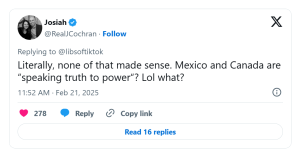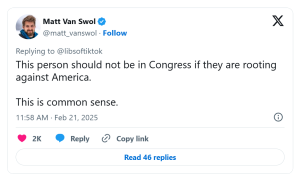In recent weeks, Representative Jasmine Crockett (D-TX) has become the focus of a heated national debate after making remarks that many have interpreted as anti-American. During an appearance on The Breakfast Club and in subsequent interviews, Crockett controversially admitted that she was cheering for Canada and Mexico over the United States. Her comments have not only drawn swift backlash from political opponents and conservative pundits but also sparked discussions about national identity, patriotism, and the evolving political landscape in America.


The Controversial Remarks
During her interview on The Breakfast Club, Rep. Crockett, a prominent member of the progressive “Squad,” made a statement that quickly set off alarm bells among her critics. “The fact that I’m rooting for Canada and I’m rooting for Mexico a lot is really wild,” she remarked, adding that these countries are “really the ones that are speaking truth to power right now… They can see what it is, and they were like, ‘We are not messing with this crazy regime from Mar-a-Lago and basically calling them thugs.’”
Crockett further justified her position by arguing that the current state of the United States is the product of choices made by its voters. “That’s what it is, but I’m like, y’all knew who he was when y’all elected him, so don’t act surprised,” she continued. In a subsequent interview with disgraced former MSNBC host Mehdi Hasan, she went even further. “People don’t understand,” Crockett said, shaking her head. “I’m at the point where it’s become hard to have an intellectual debate with any of these people because the level of stupidity they are displaying every single day is frankly embarrassing, not just in Congress but as Americans. The fact that we got the Trump presidency again is a sign that the dumbing of the United States has arrived.”
These remarks have been described by some as a “word salad” of anti-American rhetoric—comments that many found not only controversial but also deeply polarizing. Critics argue that by aligning her admiration with other nations over her own, Crockett is undermining the very foundation of national pride and unity.
Political and Public Backlash
Unsurprisingly, Crockett’s statements have generated a fierce response from various corners of the political spectrum. Conservative commentators and social media influencers have been particularly vocal. For example, on social media platforms like X (formerly Twitter), figures such as conservative commentator Matt Walsh have lambasted Crockett for her comments, accusing her of displaying contempt for her adopted country. Walsh’s tweets, along with many others, have called into question her patriotism and even her qualifications as a public servant.
Critics argue that such statements are not only damaging to the national discourse but also reinforce negative stereotypes about progressive politicians. They claim that by openly comparing the United States unfavorably to Canada and Mexico, Crockett risks alienating voters who believe in the American dream and the principles of national sovereignty.
Meanwhile, some moderate voices have expressed concern that the incendiary language could further polarize an already divided nation. In a climate where political discourse is increasingly charged, remarks like Crockett’s contribute to a growing chasm between different segments of society. These voices call for a more measured approach—one that acknowledges the need for reform without denigrating the values that many Americans hold dear.
The Broader Context: National Identity and Patriotism
To understand the full impact of Crockett’s comments, it’s important to consider the broader context of national identity and patriotism in contemporary American politics. The United States has long been a melting pot of cultures and ideas, with a national identity that has been defined by both its strengths and its flaws. However, in recent years, debates over patriotism have become increasingly divisive.
For many conservatives, the idea of cheering for another nation over the U.S. is seen as a direct challenge to the notion of American exceptionalism—a belief that the United States is uniquely positioned to lead and inspire the world. Crockett’s remarks, therefore, have been interpreted by some as a repudiation of this core idea, suggesting instead that other countries, like Canada and Mexico, offer a model of governance or societal values that they find more admirable.
On the other hand, some progressives argue that the call for reform and accountability in American politics sometimes necessitates looking beyond national borders for inspiration. They point to examples of progressive policies in other countries as models for change. However, even within progressive circles, there is debate about how such comparisons should be framed. Critics contend that while international examples can provide valuable insights, they should not come at the expense of national pride or the recognition of America’s unique contributions to global democracy.
The “Squad” and the Culture of Controversy
Rep. Crockett is a well-known member of the so-called “Squad,” a group of progressive lawmakers who have often found themselves at the center of controversy for their outspoken views. Members of the Squad, including Reps. Ilhan Omar and Rashida Tlaib, have previously faced criticism for statements deemed anti-American or divisive. Crockett’s latest remarks add to a growing body of controversial statements from the group that have drawn accusations of undermining American values.
For instance, past controversies have involved debates over issues like immigration policy, civil rights, and the handling of foreign affairs. Critics argue that the pattern of controversial statements from the Squad contributes to a perception that some members are more interested in pushing a radical agenda than in working to unite the country. This perception is further compounded when such statements are amplified by media outlets and social media platforms, leading to a cycle of outrage and backlash.
Reactions from Across the Political Spectrum
The fallout from Crockett’s comments has been swift and polarized. On one side, conservative media and commentators have seized upon the opportunity to critique what they see as a disdain for American values. Memes, opinion pieces, and social media posts have flooded the internet, each reiterating the sentiment that her remarks are emblematic of a broader trend of anti-American rhetoric among some progressive politicians.
In contrast, some progressive voices have attempted to contextualize Crockett’s comments as a reflection of deep-seated frustrations with the current state of American governance. They argue that when systemic issues persist and public institutions fail to meet the needs of citizens, it is natural for those who seek meaningful change to look elsewhere for models of effective leadership. In this view, cheering for Canada and Mexico is not an abandonment of American ideals but rather an acknowledgment that reform is necessary.
However, even among progressives, there is concern about the potential divisiveness of such rhetoric. Many worry that statements like these may alienate moderate voters who are essential for building bipartisan support for policy reforms. The challenge, therefore, is to balance the need for bold, transformative ideas with a commitment to unity and national cohesion.
The Role of Media in Shaping the Narrative
Media coverage of Crockett’s remarks has played a significant role in amplifying the controversy. Major networks and social media platforms have dissected her comments, often highlighting the stark language used and the implications for national discourse. This coverage has, in turn, fueled further debate about the state of political dialogue in America.
For example, a segment on Fox News framed Crockett’s comments as an example of the “dumbing down” of American politics, while other outlets questioned whether her remarks were an isolated incident or part of a broader trend among progressive leaders. This media-driven narrative has contributed to a polarized environment where every word is scrutinized and interpreted through the lens of partisan bias.
The Legal and Institutional Implications
Beyond the immediate political fallout, Crockett’s comments raise important questions about the future of governance and institutional accountability in the United States. At a time when debates over federal funding, state sovereignty, and civil rights are at the forefront, the rhetoric used by public officials can have significant implications for policy-making.
For instance, the controversy over transgender rights in sports—another hot-button issue—has shown how divisive political language can influence public policy and legal outcomes. Similarly, remarks that appear to undermine national unity or suggest a rejection of American values can have a lasting impact on the collective psyche and the functioning of democratic institutions.
The challenge for policymakers and public leaders is to foster a culture of respectful, constructive dialogue that acknowledges the need for reform while preserving the core values that underpin American society. In this context, controversial statements like those made by Rep. Crockett serve as both a warning and a call to action—a reminder that the language of politics must be handled with care and responsibility.
Looking Ahead: The Future of Political Discourse
As the national conversation continues to unfold, the remarks by Rep. Jasmine Crockett offer a snapshot of the broader challenges facing American politics today. In an era marked by rapid technological change, deepening partisan divides, and widespread skepticism about public institutions, the quality of political discourse is more important than ever.
For some, Crockett’s candid expression of frustration is a necessary release—a way to highlight systemic failures that, in their view, have led to the current state of affairs. For others, her choice of words is seen as inflammatory and counterproductive, risking further polarization and undermining the possibility of meaningful reform.
What is clear is that the future of political discourse in America hinges on our ability to engage in thoughtful, respectful conversations about the issues that matter most. Whether it is through policy reform, increased accountability, or a renewed commitment to unity, the path forward must be navigated with a balance of passion and pragmatism.
Conclusion: A Crossroads for American Democracy
Rep. Jasmine Crockett’s controversial remarks—expressing support for Canada and Mexico over the United States and decrying what she sees as a pervasive “stupidity” among American voters and lawmakers—have ignited a fierce debate that reaches far beyond the realm of partisan politics. Her comments have drawn harsh criticism from conservatives, who accuse her of anti-American rhetoric, while some progressives argue that her frustration reflects a broader need for systemic change.
As America grapples with complex issues ranging from economic policy to civil rights, the quality of our political discourse will play a critical role in shaping the future of our nation. The challenge for public figures is to articulate their visions in a way that inspires constructive dialogue rather than deepening divisions. In this moment, Rep. Crockett’s words serve as a stark reminder of the high stakes involved in the ongoing debate over the direction of American democracy.
What do you think about Rep. Crockett’s remarks? Do they reflect a legitimate concern about the state of political discourse in the United States, or do they simply contribute to an already polarized environment? Share your thoughts on Facebook and join the conversation about the future of American politics and the language we use to describe it.
In these transformative times, every word carries weight. As we navigate the challenges of modern governance, let’s strive for dialogue that bridges divides and fosters a deeper understanding of the issues at hand. Your voice is vital in shaping the future of our democracy.
https://usajournal.news/wp-content/uploads/2025/02/Crockett.mp4?_=1

